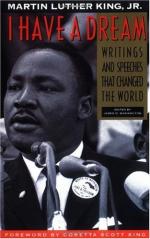
|
| Name: _________________________ | Period: ___________________ |
This test consists of 15 multiple choice questions and 5 short answer questions.
Multiple Choice Questions
1. According to Chapter 12:"Nobel Prize Acceptance Speech," who was the great shaman of the Nation of Islam?
(a) Elijah Muhammad.
(b) Benjamin F. Chavis, Jr.
(c) Louis Farrakhan.
(d) Malcolm X.
2. When did Dr. King deliver his last, and greatest, sermon?
(a) April 5, 1968.
(b) May 3, 1968.
(c) April 3, 1968.
(d) March 3, 1968.
3. Who introduced Dr. King for his last and final sermon?
(a) Michael Schwerner.
(b) Lyndon B. Johnson.
(c) Ralph Abernathy.
(d) Stokely Carmichael.
4. What year was considered a momentous year in American history and in the life of Martin Luther King, Jr.?
(a) 1963.
(b) 1955.
(c) 1965.
(d) 1960.
5. At what church did Dr. King deliver his most historic and controversial statement tying the war and the Civil Rights Movement together?
(a) First Baptist Church.
(b) Riverside Church.
(c) Wanderings Church.
(d) Morningside Baptist Church.
6. What quote from a civil rights hymn did President Johnson quote before a joint session of Congress in 1965?
(a) "We shall not be moved!"
(b) "Keep your eyes on the prize!"
(c) "Oh freedom!"
(d) "We shall overcome!"
7. What year was the Ebenezer Baptist church formed?
(a) 1920.
(b) 1909.
(c) 1894.
(d) 1936.
8. On what date was the church bombed that killed the little girls where Dr. King delivered the funeral sermon?
(a) October 17, 1960.
(b) September 15, 1963.
(c) June 17, 1956.
(d) December 5, 1955.
9. Who began to question President Eisenhower's commitment to more troops in Vietnam?
(a) People outside the United States.
(b) People of color.
(c) People of conscience.
(d) People in the military.
10. On what date was the Civil Rights Bill of 1964 signed?
(a) July 4.
(b) June 7.
(c) July 2.
(d) June 12.
11. In 1964, what party was refused a seat by the Democratic National Convention?
(a) Whigs.
(b) African American Republican Party.
(c) Democratic Party Representing Minorities of America.
(d) Mississippi Freedom Party.
12. What war began to take precedence over the Civil Rights Movement given that military presence was needed?
(a) The Vietnam War.
(b) The Cold War.
(c) WW II.
(d) WW I.
13. According to the chapter "Black Power Defined," what do the "powerful" never lose?
(a) Opportunities.
(b) Themselves.
(c) Chances.
(d) War.
14. Where did Dr. King accept his Nobel Peace Prize?
(a) Madrid, Spain.
(b) Oslo, Norway.
(c) Paris, France.
(d) Halmstad, Sweden.
15. According to Chapter 20: "I See the Promised Land," what did Dr. King have a deep sense of?
(a) American pride.
(b) Common ideals.
(c) Religious vocation.
(d) Hidden agendas.
Short Answer Questions
1. What was the name of the police chief who ordered his officers to turn hoses on demonstrators during the registration of black students at its state university?
2. Why were Western nations uncomfortable with the USSR?
3. When did the demonstrations in Selma, Alabama, reach their worst problems?
4. Despite opposition, what two universities did President John F. Kennedy authorize federal marshals to accompany black students to registration?
5. What was the publication date from Dr. King's article from Chapter 17: "Black Power Defined"?
|
This section contains 475 words (approx. 2 pages at 300 words per page) |

|




